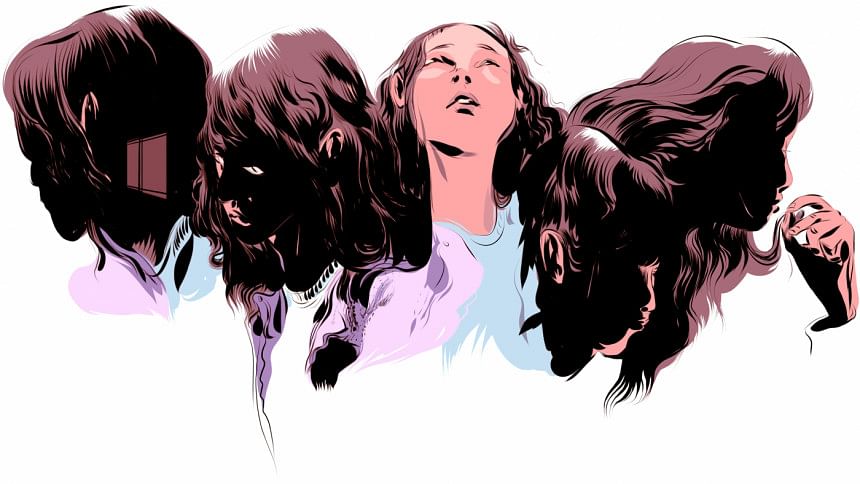Social ripples of rape

When alleged rapist Shafat Ahmed and accomplice Shadman Sakif were arrested, and the former's father brought under investigation, I had decided not to write about the rape incident that took place in a hotel in Banani. The actual rapes have, sadly, been described to some detail – and no one, but the culprits, needs to relive the barbarity of it. But what, perhaps, needs recording are the social ripples generated by the episode.
Of course, the first order of business is a backlash against the disproportionate favour bestowed upon the victims by society and media reports alike. "Why do you not act thus when it happens outside of Banani?" And it is a justified question. In fact, this is precisely what made me reluctant to write about this. Why relegate Hazrat Ali and Ayesha to the rail-tracks, but leap to clicktivism over this? But we know why: we are a classist and tribalist lot. And that isn't the issue here. The issue is 'rape'.
To accept that we are inherently flawed and biased is perhaps a first step in starting this long-overdue conversation about rape. That it had to start from this incident is, for now, an insignificant detail. However, the beginning of a nuanced discussion of rape is not in itself an insignificant detail.
From a purely analytical standpoint, the case has some important features. The victims overcame the paralysing fear of stigma and spoke out. Once they spoke out, they found public support. This will no doubt set a precedent and encourage others to come forward. Citizens have already shown their support for the young women. It is time for mass media to demonstrate how delicately they are able to handle these cases and thus encourage future victims to be candid in their quest for justice.
"Many of us have sighed with relief after two of the rapists/accomplices were arrested recently. With this, we also need to think about what has been achieved. Have we changed minds? And deep-rooted patriarchal views of women's appearance and mobility?
The aggrieved party also managed to find a powerful narrative that worked in their favour. The goal was not only to evoke sympathy, but also to trigger action. For example, the two victims were referred to as 'students' – a category that is traditionally associated with idealism and positivity. Narration of the lopsided power dynamics – both between the tormentors and the victims and their respective families – helped generate public empathy. And where law and order systems need to be pressurised into action by public opinion – these are important reminders for all.
Of course, law enforcement officers deserve credit for rounding up two of the suspects. I hope the other rapist – the now-disowned con artist and event-manager – does not disappear into the smog of misinformation and political clout (if it weren't illegal and illiberal, I would've happily convened a lynch mob in this man's honour). But the two arrests are important: especially considering that Banani police at first refused to take the plaintiffs' case for several days. Perhaps more than the actual crimes, the thought of police kowtowing before influential quarters was what ignited a social media storm. Photos showing the alleged rapists posing for photograph(s) inside a police station further fuelled the rage.
While arresting suspects redeems the force to some extent, it is also important to hold an inquiry into if and why lodging of a case had been initially stalled. In that connection, it is also important to evaluate and improve how law enforcement officers interact with victims of violence against women. This is 2017: we cannot have troglodytes manning the posts where tortured and vulnerable women are encouraged to seek restitution.
Mainstream media responded better. First off, journalists deserve a pat on the back for (a) not naming the victims and (b) keeping the focus on the alleged rapists. Even with raids on terror dens and loss of fireman Matin, they have commendably stuck to the story. What they ought to be reprimanded, if not prosecuted for, is how they hounded victims and staked out their homes. Still, I admit that reporting was responsible; sensational details were kept out. What did seep in – the political-power overtones, methamphetamine addiction and pretty ex-wife – eventually composed important parts of the story.
It has been pointed out that the social outroar stemmed largely from a sense of institutional failure. While routinely ridiculed, social media chatter certainly buoyed this incident and forced mainstream media to follow-up the story. It was thus that the suspects' fathers and their behind-the-scenes rescue efforts became known. And it was thus that their businesses were identified, and in a few cases, boycotted. Once Facebook users began unearthing and passing on to media inconvenient photos and connections, law enforcement activity seemed to gain momentum.
So, in a way, your Facebook post and your discussion actually helped arrest the alleged rapists. However, only so many cases can reach such a critical mass and exert pressure on authorities. In the end, there is no other recourse to investigating institutional failures.
What does need to be reiterated is a concern about the language in which all above parties discuss rape. In Bangla, we must stop describing rape as a 'loss of honour' or a 'loss of virtue'. If anyone loses honour or virtue during a rape, it is undoubtedly the rapist. It is important to challenge the notion of 'honour' being located in a woman's vagina. At the same time, we must not equate rape to just any form of violence. We must remember that usually rape is also about patriarchy, inter-gender power dynamics and fragile masculinity. It is about inflicting the sense of loss of honour and virtue. It is as much a psychological assault as it is a physical one.
Every account needs to repeat that: rape is not an act of sex; it is an act of violence. Therefore, conversations about it must not be romanticised, sexualised or depicted as an outcome of prevailing situations, relationships or conflicts. The idiocy of invoking revealing clothing, sexual signals, respectable hours and unsafe spaces must be forever shunned. We live in civilised society. We punish illegitimate violence. Fullstop.
Lastly, because sexual violence is so emotionally-charged, it is difficult to talk about it without the fear of being misunderstood: but girls need to be cautious. They shouldn't have to be. But they need to be. Times have changed; men haven't. Therefore, anything from skimming through 'what-to-do-when' articles to pepper sprays to basic self-defence training will help. These days there are personal safety apps for smartphones that can alert a relative, friend or police station at the tap of a finger. I hope all these things will become obsolete one day. Sadly, that day isn't here yet.
After Jyoti Singh Pandey was raped in Delhi in 2012, a social tumult followed. Thousands upon thousands of citizens protested the language of victim-blaming and the central government's failure to provide enough security for women. A judicial committee was set up to explore and take citizen suggestions about legal reforms that enabled speedy trials for rapists. Some 80,000 citizens were consulted before an amendment was passed to allow fast-tracking cases of violence against women.
Throughout this period, the victim was referred to only as 'Nirbhaya' or 'the fearless one'.
Many of us have sighed with relief after two of the rapists/accomplices were arrested recently. With this, we also need to think about what has been achieved. Have we changed minds? And deep-rooted patriarchal views of women's appearance and mobility? We can choose to term the arrests as marking the end to a sensational rape case. Or we can choose to see this as the beginning of a very important, candid and nuanced conversation about sexual violence.
The writer is a strategy and communications consultant.





Comments